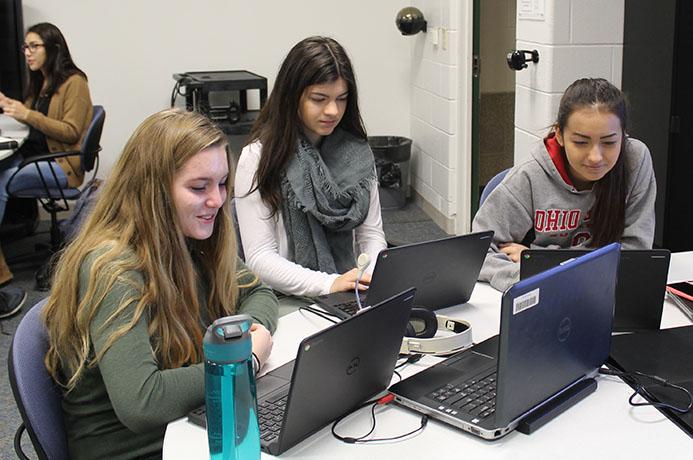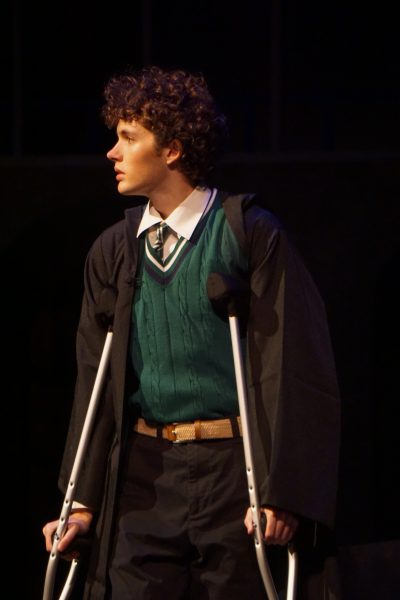World Language fully institutes three modes of learning to curriculum
Juniors, Juliana Gescey, Amy Rogala, and Yizcel Carrera, work in York’s mediascape lab for their Spanish 4 Honors class.
In the past two or three years, a plethora of curriculum changes have been taking place in the York World Language Department. The department has been undergoing a shift from learning solely grammar and vocabulary from textbooks, to having the three modes of learning: interpersonal, interpretive, and presentational.
“The three modes of learning make our world language classes much more culturally and personally focused than before,” said the World Language Department chair Jessica Nall. “The department’s goal was to have students using the language they are learning in a more meaningful way.”
One of the main changes to the curriculum is how classes now heavily focus on authentic listening clips; students listen to audio of native speakers of the language they are taking.
Nall said, “Students are getting a chance to hear accents that are different from their teacher’s accent.”
Students around York have varying views on whether or not the curriculum change is positive. Positively, with the new curriculum, students continue to have conversations using vocabulary given to them by their teacher, but more conversations are using personal vocabulary that the students researched themselves. These changes are extremely useful for travelling, and in general using the language outside of the classroom environment due to it being personalized.
“I’m in Spanish one and we listen to audio clips of native speakers, and I think they really help me have a better understanding of how people speak Spanish outside of the U.S,” said Amanda Krause, freshman.
For the lower level foreign language classes, the three modes of learning appear to be highly popular. However, when it comes to higher level classes, students are viewing the new curriculum as somewhat unproductive.
“I think that in real life I could ask them to speak slower,” said junior Maddie Perry in French 4 Honors, “I liked learning vocab a lot more because I felt that I was always learning new words, but now I feel like I’m guessing and that my French vocabulary is very limited due to us stopping learning vocab at a simplistic level.”
Other students have similar concerns about the productivity of their curriculum, or whether or not it is truly helpful.
“We will listen to native speakers for listening portion of our tests, but rarely practice listening to these types of accents prior to testing,” junior Nici Despinich said, “I think it would help a lot more if we listened to more audio as class activities.”
Although it seems there are some negative aspects to the new curriculum, overall people tend to see how it will help them in their future international endeavors.
“Even though it seems harder to maintain your grade, I think it is better not being strictly based off of vocab,” said Amanda Bardhoshi, junior, “If you think about it, Spanish in the real world is not going to be word for word vocab. So, it’s better to get ourselves more used to hearing, speaking, and writing the language.”
The three modes of learning seem to be here to stay despite the lack of popularity among certain classes. The curriculum’s overall popularity and clear objective make it a very positive addition to York’s World Language Department.

Kylie Travers is a senior at York. This year, she is Co-Editor-In-Chief of the York-hi. Other than her extremely passionate love of writing and reading...










